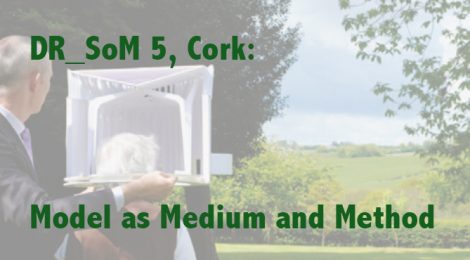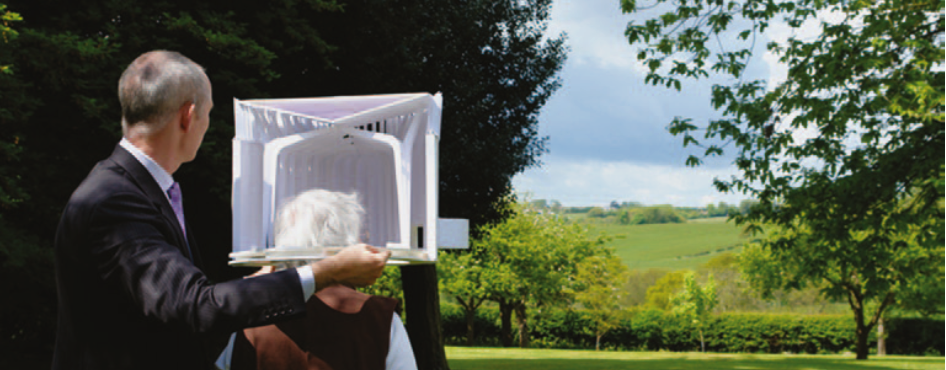
DR_SoM Cork 2016-Nov-3-4
Session 5: Model as Medium and Method
On architectural research questions, and how models can address them
Cork Centre for Architectural Education, Ireland
3-4 November 2016.
Download the Announcement as PDF.
The ARENA DR_SoM group invites architects and architectural design researchers to share their experiences with peers. This will not be done in a theoretical way, but based instead on the presentation of own current design and research work. A Scientific Committee will select 10-15 proposals for presentation at the event.
The fifth session of DR_SoM (Design Research Series on Method) will take place at the Cork Centre for Architectural Education, Ireland. It will focus on when, how, and why design research can methodologically rely on spatial models, both physical and virtual. More particularly, the seminar will investigate coherence between the insights which are provided by the model or by model-making, and the research question at stake. Why is making a model the most appropriate way to answer the research question? The DR_SoM session looks at the revealing and constituting power of models, and aims to inspire the participants in the capacity of models and model making as particular ways of gaining and sharing insights.
We are looking for presentations of projects and practices that frame models and model-making in a rigorous way, in terms of aims, methodologies, and forms of critical reflection that might even acknowledge and celebrate the importance of meandering and failure. Participants who want to ask questions about which way to go, are welcome. Presentations are invited from architectural researchers who are undertaking design research in practice and academia, and from those who are studying the processes and methodologies of design research.
MODEL
This meeting is focussed on an artefact and a process which is familiar to all architects. However the function of the architectural model is not always made explicit. The meeting therefor is intended to re-examine the role of modelling, and in particular, its relevance in carrying out design research. This may be a preliminary process leading to a design product, or it may be a more abstract process carried out for the purpose of generating knowledge.
Design process models are not necessarily concerned with the production of an iconic representation with the primary purpose of mimicry of the appearance of a proposed new building. The abstraction that is adopted in such models is often a key to their functionality as a research tool. Abstraction is a process of isolating or emphasising that which is considered most relevant to a question the designer wishes to answer. At the early stages of design, sketches also fulfil this function, and might be considered as graphic models which have the great advantages of economy and ease of production, manipulation and modification. Models can clarify the research position, but also extend it; they can produce, disrupt, or provoke; they can be inquisitor and witness.
Both spatial models and sketches may also be used as search tools, with the purpose of identifying which questions need to be answered in a particular project. The identification of Research Questions is one of the most important differentiators in achieving external recognition of the “research” nature of architectural enquiries. We need to be aware that there are still fundamental differences in approaches to identifying “Research Questions”. These range from ignoring the need to identify the Question, in favour of open-ended explorations of identified topics of interest, to an insistence on the refinement of a Research Question until it fits with a specific methodology for providing an unambiguous answer. Most recognised design research proposals fall between these two extremes and identify a question that at least appears to be “answerable”.
MEDIUM and METHOD
In this meeting we are ready to go beyond the collection and categorisation of lots of examples of the different “media” in use. We wish to discuss the relationship between the Research Question and the Medium. What and how is the model actually mediating? In particular, we would like to hear presentations about the epistemology behind the selection of a specific medium, and its coherence with the question which is to be answered or the issue which is to be explored.
Proposals, registration, publication
The DR_SoM seminar at Cork will take place on Thursday 03 and Friday 04 November 2016. There will be no parallel sessions. There is no registration fee; however, the number of participants will be limited to 30, of whom a maximum of 15 researchers can present their research. For each presentation, a timeslot of about 40’ provides plenty of time for presentation and discussion. Discussions will be held as a round-table debate.
Candidates who wish to present their research send an abstract of no more than 250 words, (and any additional graphic material, if required) in pdf to johan.dewalsche@uantwerpen.be before Monday 3 October 2016. Selections will be made by the scientific committee, and communicated on Friday 7 October. As far as the number of participants allow, researchers and practitioners can join the session and contribute to the debate without presenting; please contact johan.dewalsche@uantwerpen.be.
Full papers are not required as we recognize work in progress. On the contrary, participants are invited to write an illustrated paper afterwards. The accepted papers will be published as an ARENA open-access on-line publication, with a print-on-demand option, as part of the DR_SoM series (with ISBN and ISSN number) by BK Books Delft. For the first issue of this series, take a look at:
http://www.arena-architecture.eu/publications/dr_som-01-prototypes-and-paradigms/
For any questions related to content of this, the fifth DR_SoM session in Cork, please contact Kevin McCartney at k.mccartney@ucc.ie for any questions related to practicalities and organisation please contact gerrymccarthy@ucc.ie. For any questions on the project of DR_SoM in general, contact Johan De Walsche at johan.dewalsche@uantwerpen.be
3 October 2016 Abstract submissions
7 October 2016: Notification of Acceptance
Provisional programme
3 November 2016
ca. 13.30 Session 1
ca. 19.30 Dinner (to be paid by participants)
4 November 2016
ca. 9.00 Session 2
ca. 13.00 Lunch (provided by CCAE)
Practicalities
ORGANISATION AND VENUE
University College Cork & Cork Institute of Technology,
Cork Centre for Architectural Education (CCAE)
9/10 Copley St, Cork, Ireland
Admin Office: Tel. +353 21 429 8401
Kevin McCartney (Director of CCAE: mobile: 00353 879 222 041 )
ACCOMODATION
Clarion Hotel (short walk from CCAE)
Jurys Inn Hotel (short walk from CCAE, lower prices)
MEALS
We have no budget for the event, and hence the dinner on Day One will be taken outside at the expense of participants. All participants are invited for a Conference meal on the Thursday evening, with advance reservations, and to be paid for by participants (40€).
The Cork Centre for Architectural Education will provide coffee, tea and snacks at mid-afternoon, and the mid-morning breaks.
TRAVEL to Cork City
Cork Airport is only a 15 minute taxi drive from the city centre. It has many connections to European cities including some of European hubs like Amsterdam, Paris, Dusseldorf and London Heathrow (and London City Airport and Stansted Airport). And in the USA: Boston, and Chicago.
The majority of travellers to Ireland arrive at Dublin Airport, 230 km from Cork. There is a regular train service from Dublin to Cork, but this takes almost 3 hours, and it requires local travel of at least an hour from Dublin airport to Heusten Railway Station If you do not intend to visit Dublin city, there are coach services direct from Dublin airport to Cork City centre. (This is the most economic and my own preferred method of getting to Cork via Dublin Airport). From Scandinavia, it may be easier to fly via one of the European hubs into Cork Airport, rather than via Dublin.
Skyscanner website says this about Cork Airport:
“There are four major airlines offering cheap flights from Cork, including Ryanair, Jet2, Aer Lingus, and Wizz Air. Travellers can choose from an array of destinations in the United Kingdom and continental Europe. Some of Ryanair’s top routes leaving from Cork include flights to exotic destinations such as Krakow, Bordeaux, Alicante, Lanzarote, and Milan.
Aer Lingus connects passengers with major international cities such as Nice, London, and Paris, while Jet2 offers flights to Newcastle. Wizz Air is a Polish carrier offering flights to Warsaw, Gdansk, Vilnius, and Wroclaw, among other exciting eastern European destinations.”
about the DR_SoM project
Design research, a large umbrella
In design research the research process is highly typified by the role and position of the act of designing, by the design proposal (an object, a building, an urban project, a landscape), by the specific capacities and fascinations f the researcher, by the profile of stakeholders, by the audience, by the research environment, by contextual references, and by the mutual interaction of these factors. As a result, architectural design research acts as a large umbrella, covering multiple approaches and addressing distinct audiences.
Design Research, Series on Method
After some decades of experimentation and ontological dissent, design research has come of age. At the same time, due to the amount of parameters, paradigms and perspectives that directs its conduct, design research is a multiple concept, a catch-all term in need of clarification and discrimination.
‘Design Research, Series on Method’ (DR_SOM) consists of a series of research seminars and workshops, based on the rationale that discerning common and distinctive features in the broad scope of approaches covered by the epithet “design research”, will contribute to a better understanding of its specific capacities. The identification of particularities and coherence between themes, tools, strategies and discourse will be helpful to be more precise in writing research proposals, to allow for identifying appropriate peers, resulting in a more accurate assessment of the outcome, and, eventually, to inspire future endeavours. At last, a better comprehension of design research as an academic field and culture will contribute to a better communication, interaction and exchange with other research disciplines and communities. It will reveal its capability for inter- and trans-disciplinary research, and its capacity for offering new approaches to pending issues.
The seminars
In each meeting, DR_SOM sequentially focuses on a specific approach, and looks for common ground and distinctive qualities and conditions. It is a two day event consisting of workshops where early stage PhD design researchers, selected on either representativeness or originality in approach towards the theme, interact with a panel of senior researchers and an audience of peers. There are no parallel sessions, the number of participants is limited to 30 persons, discussing 10 to 15 projects.
DR_SoM is a project within the ARENA network for architectural research.
For this session, the DR_SoM scientific committee consists of :
Kevin McCartney, CCAE Cork, (organiser and host)
Johan De Walsche, UAntwerpen (project leader)
Oya Atalay Franck, ZHAW Winterthur (project leader)
Roberto Cavallo, TUDelft
Murray Fraser, UCL Bartlett
Bernard Kormoss, ULG Liège
Flora Samuel, SoA Reading
João Sequeira, CHAIA U. Évora / CIAUD U. Lisbon
Johan Verbeke, KULeuven/Aarhus
Pieter Versteegh, ESA‐PSYCHE

“Imaging the building on the site using a model as a hat.” Bishop Edward King Chapel © Niall McLaughlin Architects

